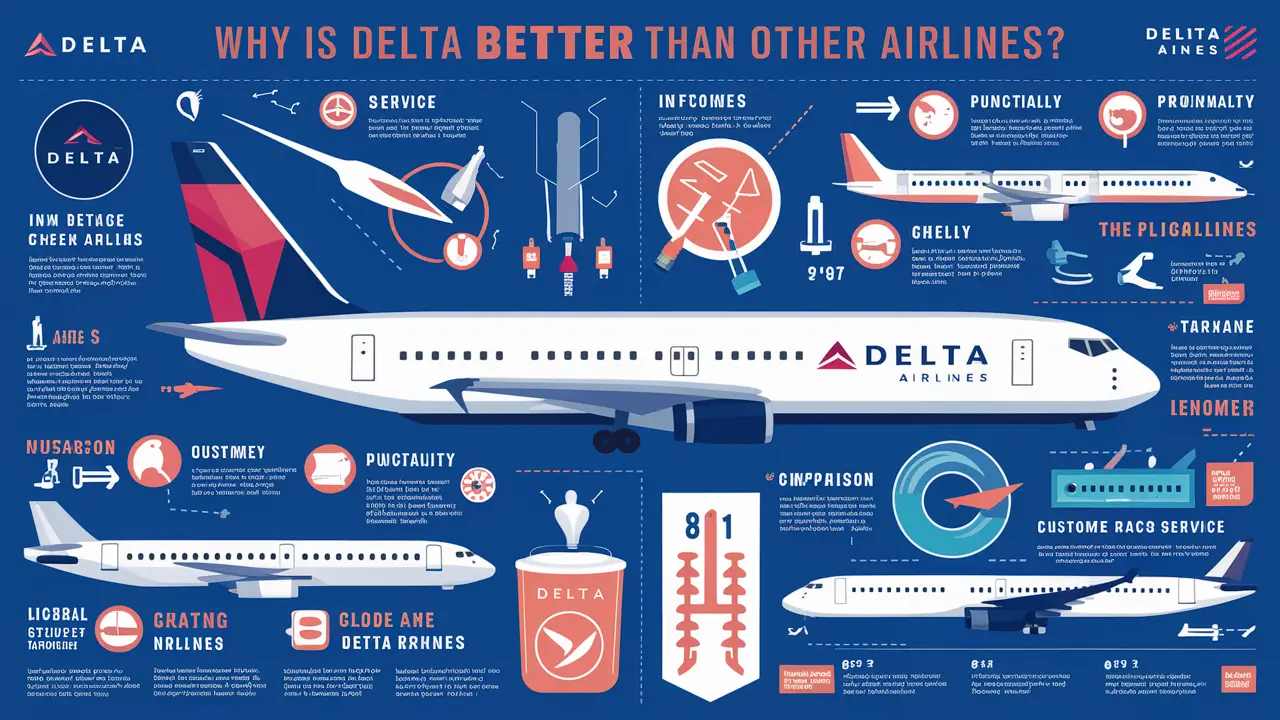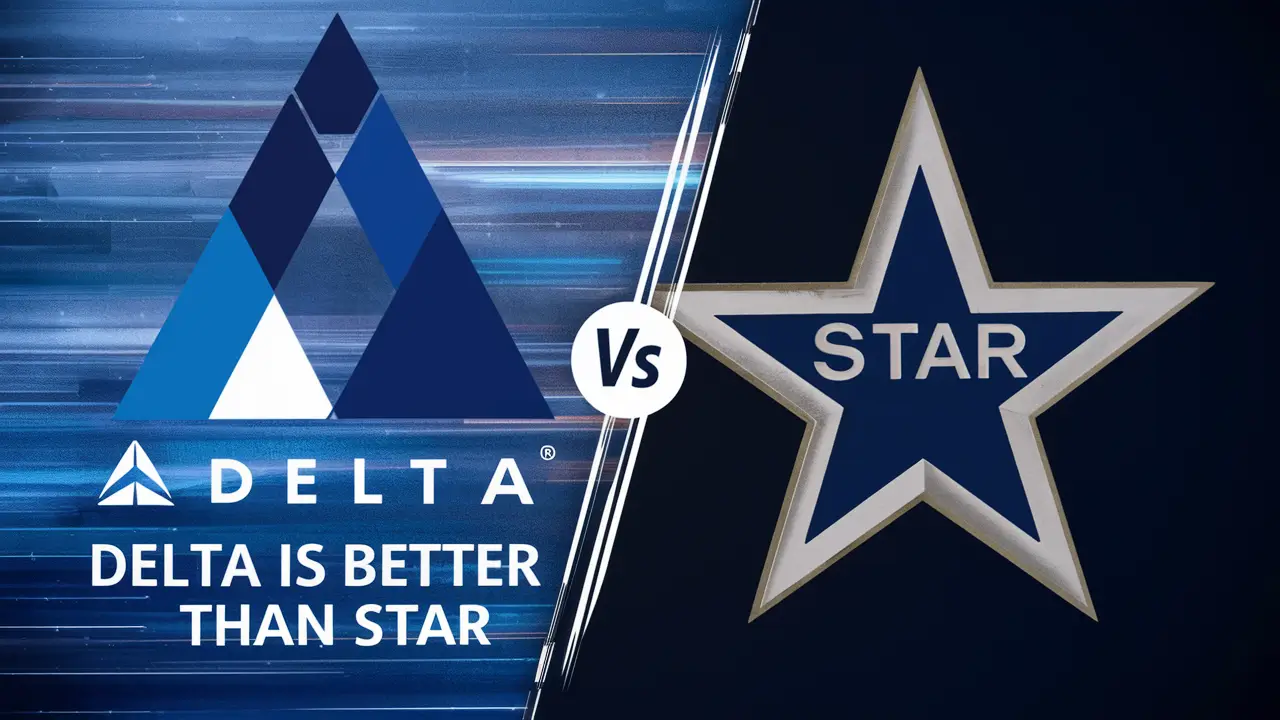Simple Tips About Why Is Star Better Than Delta

Why Star Delta Starter Is Used Instead Of Dol At John Whyte Blog
The Great Airline Debate
1. Navigating the Skies
Alright, let's dive into the age-old question that often pops up when travel planning gets serious: Star Alliance or Delta? It's kind of like asking whether you prefer coffee or tea—both get you where you need to go (eventually!), but the experience can be wildly different. To make a truly informed decision, it's not about blind loyalty; it's about understanding what you value most in your journey.
We're not talking about a simple good vs. bad scenario here. Both Star Alliance and Delta Air Lines, along with its SkyTeam partners, offer extensive networks, frequent flyer programs, and various onboard amenities. The real distinction lies in the nuances — the little things that can make or break your travel day. Are you a stickler for lounge access? Do you hoard miles like a squirrel with nuts? Or are you just looking for the best deal to get from point A to point B? These considerations are key.
Think of this as a friendly guide to help you decipher the airline alphabet soup. Forget complicated charts and jargon. Let's break down the key differences in plain English, so you can confidently choose the best option for your next adventure. We'll look at route networks, reward programs, and the overall travel experience.
It's important to remember that airline experiences can vary significantly depending on the specific routes, aircraft, and even the day of the week. So, while we'll be making some generalizations, keep in mind that your mileage may vary. Now, buckle up, and let's get this show on the road!

Why Is Delta Better Than Other Airlines? Rapidoair
Global Reach
2. Mapping Your Dream Destination
One of the first things to consider when choosing an airline alliance or a specific airline is their route network. Simply put, can they get you where you want to go? Star Alliance, being the world's largest airline alliance, boasts an impressive global footprint. With member airlines spanning almost every corner of the globe, you're more likely to find convenient connections and direct flights, especially to less common destinations.
Delta, primarily through its SkyTeam alliance (although this comparison mainly focuses on Delta itself), offers a strong presence in North America and Europe. However, when it comes to destinations in Asia, Africa, and South America, Star Alliance generally has a more comprehensive network. This isn't to say Delta can't get you there, but you might find yourself with more layovers or relying on codeshare agreements with other airlines.
Consider your travel habits. Do you frequently travel internationally to diverse locations? Or are your trips mainly within North America and Europe? If the former, Star Alliance might be the better choice. If the latter, Delta could be a perfectly viable option. Take a look at the destinations you're likely to visit in the next few years and compare the route maps of both Star Alliance and Delta (or SkyTeam) to see which offers better coverage.
Furthermore, think about the convenience of connections. Star Alliance often has multiple hub airports in different regions, offering more flexibility in routing. Delta's main hubs are primarily in the US, which can sometimes lead to longer travel times for international journeys. Remember, shorter travel times can mean more time to enjoy your destination! So, route network is a big piece of the puzzle when deciding if "Star better than Delta".

Loyalty Rewarded
3. Earning and Burning Miles
For many travelers, frequent flyer programs are a significant factor in airline choice. Who doesn't love racking up miles and points to redeem for free flights and upgrades? Both Star Alliance and Delta offer competitive loyalty programs, but they differ in their earning structures, redemption rates, and elite status benefits.
Star Alliance's strength lies in its wide range of member airlines, each with its own unique loyalty program. This gives you the flexibility to choose a program that best suits your travel style and earning preferences. Some programs are known for their generous mileage earning rates, while others excel in offering upgrade opportunities. However, this variety can also be a double-edged sword, as the rules and benefits can vary significantly between different Star Alliance programs.
Delta's SkyMiles program is known for its simplicity and straightforward earning structure. You generally earn miles based on the price of your ticket, rather than the distance flown. This can be advantageous for expensive fares, but less rewarding for budget travelers. Redemption rates for award flights can also fluctuate, making it sometimes difficult to predict the exact number of miles needed.
Consider what's important to you in a loyalty program. Do you prioritize earning miles quickly? Are you more interested in upgrade opportunities? Or do you value simplicity and predictability? Research the various Star Alliance programs and compare them to Delta's SkyMiles program to see which one aligns best with your needs and preferences. Also, don't forget to factor in elite status benefits, such as lounge access, priority boarding, and free checked baggage, as these can significantly enhance your travel experience.

The In-Flight Experience
4. Soaring in Style
Beyond routes and rewards, the actual in-flight experience plays a crucial role in overall satisfaction. After all, you'll be spending several hours (or even days!) in the air, so comfort and amenities are paramount. Both Star Alliance and Delta aim to provide a pleasant journey, but their approaches and offerings can differ.
Star Alliance airlines often boast a wider range of onboard products and services, reflecting the diverse cultures and standards of its member airlines. You might find yourself enjoying gourmet meals on one flight and savoring authentic local cuisine on another. The seat comfort and entertainment options can also vary significantly depending on the airline and aircraft. This can be both a blessing and a curse—you might stumble upon an exceptional experience, or you might end up with a less-than-stellar one.
Delta, on the other hand, tends to offer a more consistent and standardized in-flight experience. You can generally expect comfortable seats, decent entertainment options, and reasonably good food. While Delta might not always offer the same level of culinary extravagance as some Star Alliance airlines, they prioritize consistency and reliability, which can be reassuring for travelers who value predictability.
Think about what you prioritize during a flight. Are you a foodie who craves gourmet meals? Do you need the latest and greatest entertainment system to keep you occupied? Or do you simply want a comfortable seat and a smooth ride? Research the specific aircraft and routes you're likely to fly and read reviews from other passengers to get a better sense of what to expect. Remember, a little research can go a long way in ensuring a pleasant and enjoyable journey. And that can help you see "Star better than Delta" from the passenger's point of view.

The Bottom Line
5. Charting Your Course
So, which is better: Star Alliance or Delta? The truth is, there's no definitive answer. The best choice depends entirely on your individual needs, preferences, and travel patterns. Consider your typical destinations, your loyalty program priorities, and your desired in-flight experience. Do your research, compare your options, and make an informed decision that aligns with your specific requirements. Perhaps Star better than Delta if you travel more internationally, but Delta might be better if you focus on North America.
Think about the things that matter most to you. Is it having access to a vast global network? Is it accumulating miles and points as quickly as possible? Or is it simply having a comfortable and reliable travel experience? Once you've identified your priorities, you can start to narrow down your options and choose the airline or alliance that best fits your needs. Don't be afraid to mix and match, either! You might find that using different airlines for different trips makes the most sense.
Ultimately, the goal is to make travel a more enjoyable and rewarding experience. By understanding the strengths and weaknesses of both Star Alliance and Delta, you can make informed decisions that will help you maximize your travel budget, minimize your travel stress, and create memories that will last a lifetime. So go forth, explore the world, and happy travels!
Remember to check official airline websites and sources for the most up-to-date information, as policies and offerings can change. The world of air travel is constantly evolving, so staying informed is key to making the best choices.

Why Delta Is Better Than Star? Rapidoair
Frequently Asked Questions (FAQs)
6. Your Burning Questions Answered
We know you might still have some questions swirling around, so let's tackle a few of the most common ones:
7. Q
A: This is a tricky one! Star Alliance generally has more lounges worldwide due to its larger network. However, the quality of the lounges can vary significantly. Delta's Sky Clubs are typically consistent in terms of quality and amenities, but their availability is more limited outside of the US. Consider which locations you frequent and research the specific lounges available at those airports.
8. Q
A: Generally, no. Mileage transfers between different Star Alliance programs are usually not permitted, or they come with hefty fees and unfavorable exchange rates. Choose your Star Alliance program carefully based on your travel patterns and redemption goals.
9. Q
A: Delta offers free checked bags for certain passengers, including those with elite status, those traveling in premium cabins, and those with certain credit cards. However, standard economy passengers usually have to pay a fee for checked baggage. Be sure to check the specific baggage policies for your flight and fare class.
10. Q
A: Absolutely. Within Star Alliance, you can typically use miles from one partner airline to book flights on another partner airline. Delta also has partner airlines, allowing you to use SkyMiles on those airlines. However, availability may be limited, and redemption rates may vary. Check the specific rules and conditions of the programs.